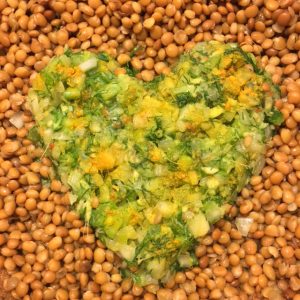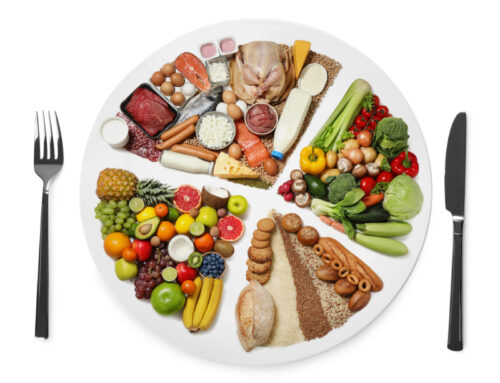‘Prevention is definitely the best medicine when it comes to heart health’.
By Dr. Kathleen Regan, ND
Healthy hearts are predicted by:
- Normal blood pressure (~120/80mmHG),
- Balanced lipid profile (Low Total Cholesterol, Low LDL, High HDL, Cholesterol Ratio)
- Body mass index between ~18 and 24.
Cardio-vascular problems such as hypertension, high cholesterol and obesity are caused by a perfect storm of poor nutrition, high inflammation and poor immune function. Much of this can be avoided or even remedied with diet and lifestyle.
Balanced consumption of carbohydrates, protein and fat feeds a hungry heart, fights inflammation and balances the immune system. Specific vitamins and minerals are required daily for the heart to function and most of these can be found in food. But what do these ‘heart friendly’ foods actually do to protect our hearts? Whether you are in wellness mode or struggling with cardiovascular issues, understanding how your foods work will help you to make the right choices.
Fruits and Vegetables: Fruits, vegetables and sea vegetables are super high in antioxidants, fibre and also happen to be a healthy source of glucose (sugar!) for our energy needs. The bright oranges, reds or yellows as well as the deep greens pack an antioxidant punch. It is the antioxidants and the fibre that help our heart. Antioxidants fight the inflammatory process that leads to cardiovascular problems. Fruits and vegetable intake is also associated with lower blood pressure; this seems to be caused by the relatively high content of potassium found in these foods. We want 6-8 servings per day (with 4-6 of those servings from vegetables)
Fibre: Fibre acts like a mop in our gut to clear toxins from our body and provide food for our intestinal bacteria. Fibre is a front line defense against high cholesterol as it helps to bind fats and carry them out of the body. Fibre also encourages the conversion of cholesterol to bile in the liver, ultimately reducing cholesterol levels. Studies have found that beyond cholesterol, fibre consumption is associated with lower death from all cardiovascular disease. We want 25g-40g per day.
Low Sugar: I cannot stress enough to patients who are trying to loose weight & reduce cholesterol that if they aren’t cutting down on sugar they will not see their cholesterol come down with diet and lifestyle changes. Our diet should include less than 25g per day (if you are a woman) and 35 grams (if you are a man) of sugar. Yet, the average patient in my practice consumes closer to 55g and above. Excess sugar overloads our body’s sugar control system (insulin) eventually causing it to malfunction (diabetes). What’s worse? When the body finds out you’ve eaten too much it converts the sugar to fat and stores it between the organs in your abdomen and on your belly. Yes, that belly fat represents too much sugar – not too much fat (in your diet)! And if you don’t have a belly, you may still have a high percentage of fat stored between the organs if you consume high sugar (‘the skinny fat person’). The abdominal fat is a direct supply of fat for the liver, which converts fat to cholesterol. This is why so many people with sugar regulation problems (diabetes) also have high cholesterol and high triglycerides. High sugar consumption causes systemic inflammation, dysregulates blood sugar, promotes obesity and leads to high cholesterol.
Adequate Protein: Protein has many, many benefits. But – in the context of heart health, adequate or slightly more than adequate protein helps to balance our blood sugar if consumed at each meal. Protein burns slower than sugars or carbohydrates and lowers the burden on our sugar control system. It is best to moderate protein sources that are red meats or deli meats as these have been shown to cause inflammation in the body (less than once per week) and replace with white meat or fatty fish. Vegetarian sources of protein such as legumes, cheese, yogurt, tofu, tempeh can also provide significant sources of protein. We want approximately 30% of our daily food intake to come from protein when we are dealing with cardiovascular risks and weight loss. This is between 90 and 110g depending on your height and weight.
- Soy A special note about soy protein. Research has found that soy proteins have beneficial effects in patients with high cholesterol by lowering serum concentrations of bad cholesterol. These benefits are also seen in healthy patients. Whole soy foods such as tofu and tempeh appear to be more beneficial than soy supplementation (isoflavone supplementation has not shown the same benefit).
Healthy Fats: Fats are important in metabolism & structure. We need fats for hormonal signalling (menstruation & fertility) as well as for insulin and blood sugar control. Fats also help in the absorption of certain nutrients and vitamins such as fat-soluble vitamins. Fat is also important for the structure of many parts of the body, particularly the nervous system where it forms a vital part of the cells and protective barrier around the brain and spinal cord. Great sources of healthy fats include nuts, seeds, plants and fish. In general, we want our fat consumption to represent 30% or less of our energy intake per day (which is about 40-55g depending on your height and weight). You want 20% of these fats to be monounsaturated or polyunsaturated fats. The other 10% or less can be from saturated fats (vegetarian sources such as coconut oil are best). We also want to balance the ratio of Omega 3s to Omega 6s found in fats since Omega 3s are anti-inflammatory and Omega 6s are pro-inflammatory.
- Nuts: Although nuts have some protein and fibre, they are mainly a source of healthy fat. Strong evidence from large population studies and clinical trials supports nut consumption for cardiovascular health which may reduce risk by up to 35%. Clinical studies demonstrate that 1-2oz/d of nuts lowers ‘bad cholesterol’ LDL-C by 2% to 19%. Obese subjects experience a smaller decrease in LDL-C from nuts compared with lean subjects. The most potent cholesterol-lowering nuts: walnuts, peanuts, pistachios, almonds, pecans, and macadamia nuts. While almonds and pecans have been shown to reduce oxidized LDL
- Olive Oil: About 10 to 30mL OR 2-6tbsp of polyphenol-rich olive oil per day has been shown to exert positive effects on systolic and diastolic blood pressure, endothelial function, inflammation and oxidative stress.
- Plant Sterols: Plant sterols (fats from plants) compete with cholesterol for absorption. They have been shown to help reduce cholesterol, can be effective in abdominal weight loss and they help to keep the skin clear! The average Western diet contains about 400-800 mg of phytosterols per day, while the dose needed for lowering the blood cholesterol level is about 2-3 grams per day. Therefore, for the purpose of reducing blood cholesterol, they should be given either as phytosterol-enriched food or as supplements.
- Omega-3’s: These are a type of anti-inflammatory polyunsaturated fat found in high amounts in fish. However, fewer than 3% of Canadians have the omega-3 dietary percentage needed to reduce their risk of heart disease. Yet we know how important these oils are for the heart. Research has shown that the risk of death from a cardiovascular event correlates with omega-3 intake. Some people avoid fish either because they are vegetarian or because they are worried about heavy metal toxicity. Although, there is much discussion that the benefits of the omega-3s outweigh the risk of consuming fish. Without much fish in your diet, you are best to supplement about 1000mg per day. Unfortunately, the content of Omega-3’s in vegetarian sources is just not as high as in fish oils.
Mineral, Vitamin, trace elements: No discussion of heart health is complete without talking about minerals such as calcium, magnesium and the fat-soluble vitamins. It turns out that JUST supplementing calcium may have a negative impact on the heart by increasing hardening of the arteries. Lessons from physiology have shown us that calcium isn’t absorbed well anyways if there isn’t any magnesium in the diet. Low Magnesium on its own is associated with many cardiovascular risk factors.
And then the plot thickens. The fat soluble vitamins (Vitamin K, D, E & A) interact with calcium/magnesium absorption AND are very important for cardiovascular function. Vitamin D levels affect hypertension and general cardiovascular health. Vitamin K prevents hardening of arteries from calcium deposits and generally enhances the absorption of heart friendly minerals.
Beyond calcium and magnesium there are many other nutrients helpful for heart health. A special word is warranted about selenium, which is quite active in the cardiovascular system. It’s deficiency can cause a lot of heart health problems. I find this is not well known amongst our patients. Consuming selenium rich foods or supplementing with selenium is cardioprotective.
Finally, it has been shown that minerals, vitamin and trace minerals may alter gene expression of cardiovascular disease. This is important so let me repeat. Having adequate levels of these nutrients may TURN OFF THE GENES THAT CAUSE CARDIOVASCULAR DISEASE. This is a good reason to consume a whole food diet and take your multi-vitamin.
Garlic: One of natures great whole food heart healers. It fights infections, thins the blood, helps to lower blood pressure significantly and helps reduce cholesterol. Good old-fashioned garlic in the diet (2 cloves per day) keeps the cardiologist away! Of course a potent supplement can be used when trying to lower actively high blood pressure.
Green Tea: Teas contain flavonoids (antioxidants) that are cardioprotective. Green tea in particular has been shown to increase plasma antioxidant capacity. It has been shown to decrease BMI. It can also help to lower lipid oxidation.
Chocolate: Saving the best for last! Cocoa products help prevent cardiometabolic disorders. Chocolate consumption has a positive influence on human health, with antioxidant, antihypertensive, anti-inflammatory, anti-atherogenic and anti-thrombotic effects as well as an influence over insulin sensitivity, vascular endothelial function, and activation of nitric oxide (a potent vasodilator for hypertension). Wow! That’s a long list of benefits. BUT one must also consider other aspects associated with chocolate consumption. For instance, the high energy density of commercially available chocolate (about 500 kcal/100 g) means excessive consumption will probably induce weight gain, a risk factor for hypertension, dyslipidaemia, diabetes, and cardiometabolic disorders in general.
The above provides a basic roadmap for cardiovascular health. I often get people to start tracking their carb, protein, fat, fibre and sugar intake on a phone app, myfitnesspal.com to raise awareness over their healthy whole food consumption. Combined with exercise, these foods can help to promote a healthy & happy heart. Of course, there are many supplements and herbs that help fight hypertension, high cholesterol and obesity but these are best recommended under the care of a naturopathic doctor who will review your diet, lifestyle, medical history and medication to provide the best treatment plan possible.






